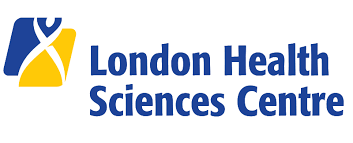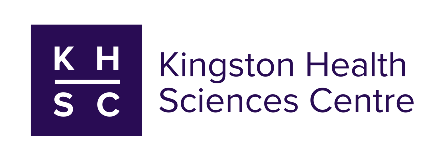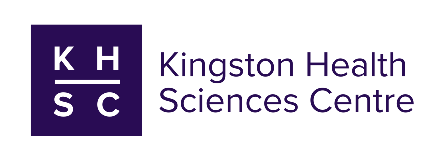Ontario Cancer Consortium

The Ontario Consortium (OCC) coalesces the expertise and efforts of clinicians, pathologists, data and translational scientists, bioinformaticians as well as software developers to contribute retrospectively and prospectively assembled patient cohorts and guide data interpretation in the relevant clinical and molecular context.
The OCC was founded on a partnership between the Princess Margaret Cancer Centre – University Health Network (PM-UHN), and the Ontario Institute for Cancer Research (OICR) to collaborate and deliver on specific requirements for genomic and transcriptomic data generation and federation for the MOHCCN. Through this partnership, PM-UHN and OICR will establish models for governance and decision-making. PM-UHN leads the OCC for MOHCCN by leveraging and building upon many of its existent infrastructure and specific capabilities including clinical research supports, pathology and biobank resources, translational research capabilities, data science and sharing, patient and community outreach activities. The vision of this consortium is to act as one of potentially several hubs in Ontario to serve as primary entry points of clinical and molecular data into the MOHCCN.
OCC is led by Dr. Lillian Siu and supported by its Steering Committee, which consists of Dr. Lillian Siu, Dr. Aaron Schimmer, Dr. Trevor Pugh, and Dr. Bradly Wouters. In 2022, the OCC officially on-boarded an additional node at Queen’s University,
including its clinical partners, Kingston Health Sciences Centre, and Kingston General Health Research Institute. The Kingston-based MOHCCN effort will be led by Drs. Harriet Feilotter and Amber Simpson. OCC is actively planning to add member sites
across Ontario to increase its footprint of precision cancer medicine initiatives.
For the first three years of its inception, the OCC will contribute patient data derived from 23 projects including solid, blood and rare cancers, across both PM-UHN and Kingston.
Goals and Objectives
- Establish the personnel and infrastructure to develop local Digital Health and Discovery Platform appliances at PM-UHN and its member sites to enable data sharing across member sites
- Bolster core capabilities in bioinformatics, text mining, pathological assessment, molecular profiling (Whole Genome and Transcriptome Analysis (WGTA), immunoprofiling, etc.)
- Recruit and link in additional Ontario centres as OCC member sites
- Plan and launch outreach activities and patient engagement programs to include underserved and hard-to-reach populations
- Create opportunities to partner with industry such as establishing a network-wide prospective clinical trial to enroll patients with specific biomarkers or signatures
- Increase training opportunities for trainees such as studentships and fellowships; and engage early career investigators to participate in MOHCCN activities via career awards for early career researchers
Projects
Each year a substantial number of projects are nominated to become part of MOHCCN. Prior to their selection, cohorts are reviewed by the OCC Steering Committee using the following eligibility criteria:
- Address at least one of the key questions set forth by the MOHCCN Scientific Questions Working Group
- Alignment with MOHCCN White Papers (Year 2+ cohorts)
- Willingness and ability (e.g. consent language allowance) to share data and biospecimens
- Availability of banked biospecimens for additional analysis
- Representation of patients with different cancer types or molecular groups
- Engagement of multi-disciplinary clinical and research groups within and/or outside PM-UHN
- Status of gold standard readiness (e.g. readiness of WGTA data, clinical data, etc.)
- Availability of matched funding support
- Have undergone internal and/or external scientific review
Partners
-
Member
-
Member
-
Member
-
Member
Projects
-

PAtient-derived Lung cancer Models Study (PALMS)
Key Researchers -

Biomarkers In Oral CANcer (BIO-CAN)
Key Researchers -

Mapping pancreatic cancer biology to drug responses
Key Researchers -
 Test how well immune checkpoint inhibitors work in individuals chosen with a new scoring system (IBV) based on analyzing the entire genetic information of tumours in various advanced cancer types.Read more
Test how well immune checkpoint inhibitors work in individuals chosen with a new scoring system (IBV) based on analyzing the entire genetic information of tumours in various advanced cancer types.Read more -

Non-Invasive Monitoring of Liver Cancer Recurrence Following Surgery and/or Transplant Using Circulating Tumour DNA Sequencing (ctDNA in HCC)
Key ResearchersAnand Ghanekar, Trevor Pugh, Gonzalo Sapisochin, Steven Gallinger, Ian McGilvray, Carol-Anne Moulton, Mark Cattral, Markus Selzner, Leslie Lilly, Mamatha Bhat, Nazia Selzner, Sandra Fischer, Laura Dawson, Jennifer Knox, Eric Chen, Robert Beecroft, John Kachura, Daniel De Carvalho, Scott Bratman, Sonya MacParland, Robert Grant, Chaya Shwaartz, Lillian Siu and Ben X. Wang -

Non-Muscle Invasive Bladder Cancer
Key Researchers -

The Integrated Molecular Profiling of Multiple Myeloma and Related Plasma Cell Dyscrasias using Blood and Bone Marrow Samples (IMMAGINE)
Key ResearchersIMMAGINE seeks to improve our understanding of the biological underpinnings of myeloma at all stages by applying advanced molecular platforms including next generation sequencing to tumour and blood s...Read more -
 A prospective study of individuals aged 55 or younger with biliary tract cancers, including gallbladder cancer and cholangiocarcinomas, that aims to identify molecular targets and reconsider the class...Read more
A prospective study of individuals aged 55 or younger with biliary tract cancers, including gallbladder cancer and cholangiocarcinomas, that aims to identify molecular targets and reconsider the class...Read more -

TRACER - ctDNA evaluation in early breast cancer
Key ResearchersEvaluating if circulating tumour DNA (ctDNA) can be used as a biomarker to improve early detection for breast cancer.Read more -

REFLECT - PRospective Evaluation of Freshly ImpLantEd Cancers in Mice to Test Drug Response in Matching Host
Key ResearchersUsing personalized patient-derived xenografts (pPDX) – which are laboratory models of an individual’s cancer grown and expanded in cohorts of immunocompromised mice – to assess impact of a v...Read more -

Ontario Familial Colon Cancer Registry (OFCCR)
Key Researchers -
 Building learning health systems to improve precision oncology care in CanadaRead more
Building learning health systems to improve precision oncology care in CanadaRead more -
 Creating an artificial intelligence tool to predict which pancreatic cancers will grow or respond to different therapies.Read more
Creating an artificial intelligence tool to predict which pancreatic cancers will grow or respond to different therapies.Read more -

HistoGx: Histomic integration with multi-omic data for massively scalable precision oncology
Key ResearchersCreating an artificial intelligence tool to analyze different data types to enable the development of more accurate and clinically meaningful biomarkers to help clinicians make decisions about patient...Read more -

Decoding Epithelial Plasticity: Exploring the Influence of SWI-SNF Complex Mutations on Bladder Cancer Progression
Key ResearchersUsing bioinformatics to enhance prognostic tests and identify new therapeutic targets to prevent bladder cancer progression.Read more -

Plasma Whole-genome Sequencing to Detect and Characterize Pancreatic Ductal Adenocarcinoma
Key ResearchersCreating an informatics tool to detect pancreatic cancer earlier using blood samples.Read more -
 Exploring how synthetic lethality can be used to help guide cancer treatments.Read more
Exploring how synthetic lethality can be used to help guide cancer treatments.Read more -
 Improving DeepTumour, a computer program that will help doctors diagnose and treat cancer patients by identifying where a cancer started in the bodyRead more
Improving DeepTumour, a computer program that will help doctors diagnose and treat cancer patients by identifying where a cancer started in the bodyRead more -

Targeting clonal hematopoiesis to prevent hepatocellular carcinoma
Targeting inflammation to prevent hepatocellular carcinomaKey ResearchersTargeting inflammation to prevent hepatocellular carcinomaRead more -

Comprehensive deciphering of the genetic, epigenetic and immunogenetic mechanisms of post-allogeneic transplant relapse in acute myeloid leukemia
Uncovering the secrets of post-transplant relapse in acute myeloid leukemiaKey ResearchersUncovering the secrets of post-transplant relapse in acute myeloid leukemiaRead more -

Improving patient matching to therapy via streamlining clinical trial eligibility criteria to guide precision oncology (PMATCH)
New software created by Marathon of Hope Cancer Centres Network researchers will connect cancer patients to clinical trials across the countryKey ResearchersBenjamin Haibe-Kains, Trevor Pugh, Tran Truong, Farnoosh Abbas-Aghababazadeh, Xin Kevin Wang, Bo Wang, Ben Grant, Sharon Narine, Mickey Ng, Anton Sukhovatkin, Matthew Boccalon, Michael Tran, Briana Layard, Alif Munim, Sehaj Bath, Omar Ibrahim, Prasanna Jagannathan, Marian Tang, Dheeraj Galvini and Anwen Zhang -

Pan-cancer neoantigen discovery and functional immunogenicity prediction using integrative deep learning approaches
Key ResearchersUsing machine learning to unlock new targets for cancer vaccinesRead more -

Simultaneous cell-free whole genome and epigenome sequencing to advance precision medicine in breast cancer
Key ResearchersBlood tests to help personalize metastatic breast cancer careRead more -
 Understanding how an appetite for fat tissue may drive metastasis in myxoid liposarcomaRead more
Understanding how an appetite for fat tissue may drive metastasis in myxoid liposarcomaRead more -
 Creating computational tools to uncover the drivers that cause cancerRead more
Creating computational tools to uncover the drivers that cause cancerRead more -

Hypoxia-driven spatial dynamics of transcriptional and epigenetic cell states in glioblastoma
Key ResearchersMapping glioblastomas to better understand the role of hypoxia in tumour heterogeneityRead more -

Gene expression prediction from cfMeDIP-seq data
Key ResearchersUsing machine learning to improve the efficacy of liquid biopsiesRead more -
 Mapping the hidden edges of glioblastoma to shape precision surgeryRead more
Mapping the hidden edges of glioblastoma to shape precision surgeryRead more -
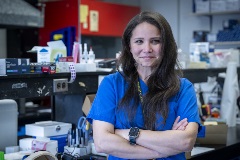 Using new surgical tools and AI to shed new light on glioblastoma recurrenceRead more
Using new surgical tools and AI to shed new light on glioblastoma recurrenceRead more -

Precision targeting of ecDNA-driven tumours through bioinformatic identification of synthetic lethal vulnerabilities
Key ResearchersTo bring new hope to patients with ecDNA positive tumours, a research team led by Drs. Dave Cescon and Mitchell Elliott (Princess Margaret Cancer Centre) will use advanced bioinformatics tools and MOH...Read more
Consortium Leadership
-
Aaron
Research Lead
Schimmer -
Bradly
MOHCCN Network CouncilConsortium Leader
Wouters -
Trevor
ResearcherProject LeaderWorking Group ChairWorking Group Member
Pugh -
Lillian
MOHCCN Steering CommitteeInstitutional LeadConsortium LeaderWorking Group ChairWorking Group MemberResearcher
Siu -
Amber
Institutional Lead
Simpson -
Harriet
Institutional Lead
Feilotter
Project Management Team
-
Sevan
Project Manager
Hakgor -
Emily
Project ManagerWorking Group ChairWorking Group Member
Van de Laar -
Aileigh
Project ManagerWorking Group Member
Kay -
Prabhjit
Project Manager
Basra
Project and Cohort Leaders
-
Aaron
Research Lead
Schimmer -
Amit
Researcher
Oza -
Ben
ResearcherWorking Group Member
Wang -
Benjamin
ResearcherWorking Group Member
Haibe-Kains -
Luke
Researcher
Brzozowski -
Tracy
Researcher
Stockley -
Trevor
ResearcherProject LeaderWorking Group ChairWorking Group Member
Pugh -
Philippe
Project LeaderMOHCCN Network CouncilWorking Group Member
Bedard -
Stéphanie
Project Leader
Lheureux -
Ming-Sound
Research LeadWorking Group Member
Tsao -
Jennifer
Project Leader
Knox -
Scott
Project LeaderWorking Group Member
Bratman -
Anna
Project Leader
Spreafico -
Gonzalo
Project Leader
Sapisochin -
Anand
Project Leader
Ghanekar -
Robert
Project Leader
Kridel -
Steven
Project Leader
Gallinger -
Housheng
Project Leader
He -
Alejandro
Project Leader
Berlin -
Theodorus
Project Leader
van der Kwast -
Lillian
MOHCCN Steering CommitteeInstitutional LeadConsortium LeaderWorking Group ChairWorking Group MemberResearcher
Siu
Related News
-

Women in STEM: Voices from TFRI and its programs
To mark International Day of Women and Girls in Science, Technology, Engineering and Mathematics (STEM), we spoke with a group of inspiring women who are pursuing research and driving innovative tech ... -

Precision medicine should be first-line treatment for metastatic pancreatic cancer, study finds
A new clinical trial comparing the efficacy of two treatments commonly used on patients with metastatic pancreatic cancer has shed new light on the importance of using genomic sequencing to inform car... -

Health technology assessment innovators share their research with the Network
On Thursday, January 15, MOHCCN members conducting Network-funded projects in the health technology assessment space presented their ongoing work in precision oncology to Network members as part of th... -
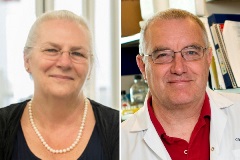
Long-time Terry Fox-funded researchers, leaders and mentors Drs. Anne-Marie Mes-Masson and John Bell appointed to the Order of Canada
Drs. Anne-Marie Mes-Masson and John Bell, two distinguished researchers with deep and long-time connections to the Terry Fox Research Institute, have been appointed to the Order of Canada, one of the ...





